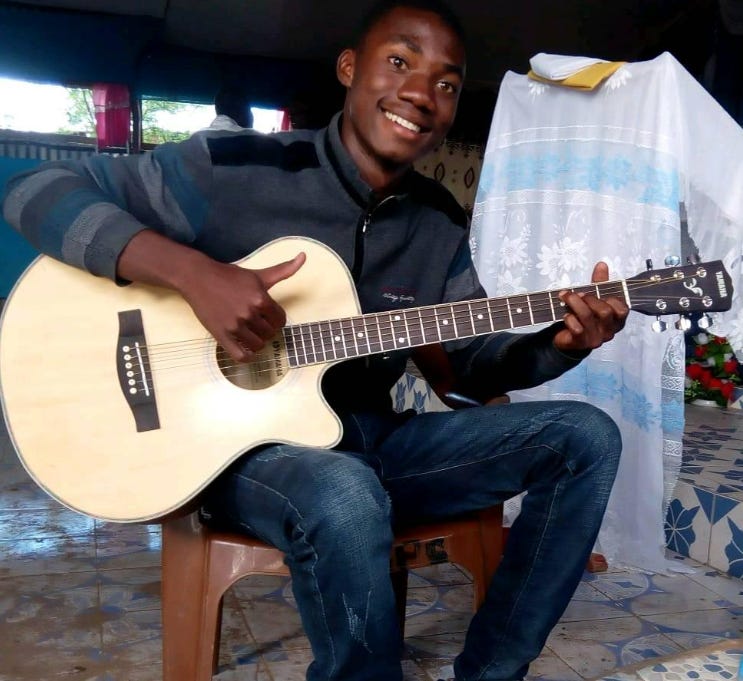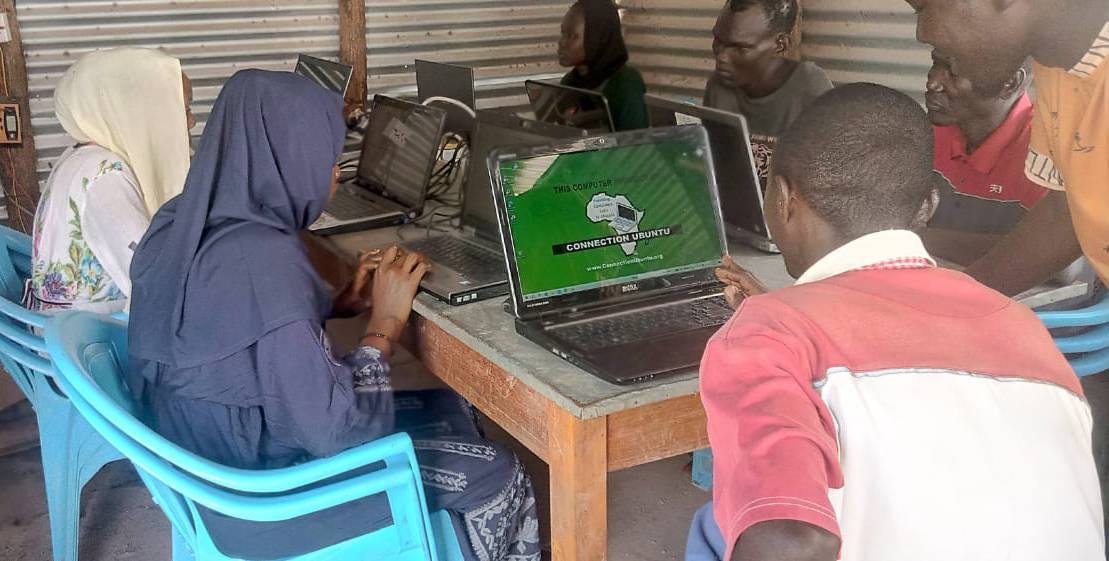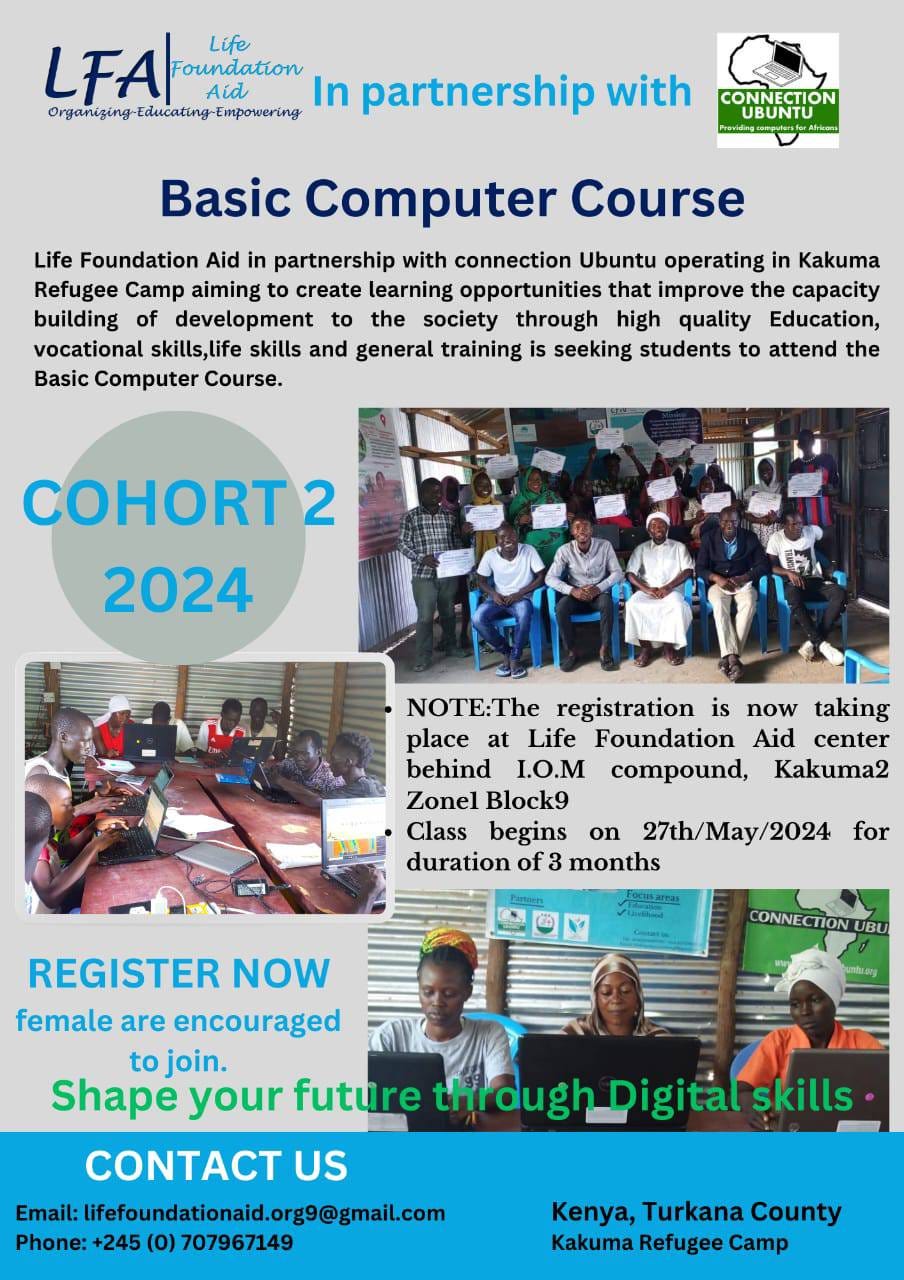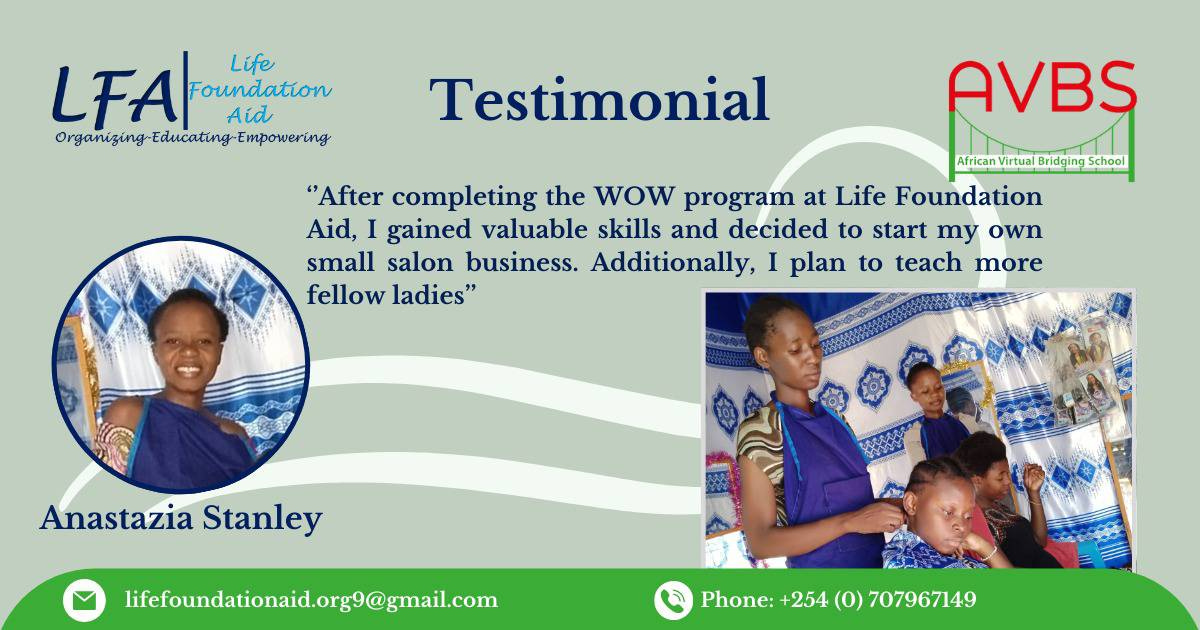Musa Munga, Life Foundation Aid, Kakuma Refugee Camp, Kenya
My motto is "even though I am passing through different circumstances, it doesn't mean it’s the end of life. With knowledge there is no limitation."
Meet Musa Munga, a 26-year old Congolese refugee living in Kakuma Refugee Camp in Northwestern Kenya, Turkana County. He is the founder and director of a Community Based Organization called Life Foundation Aid. Musa is a multi-talented community leader, organizer, and entrepreneur. Read on and you’ll be treated at the end with a YouTube video of Musa singing a song that he wrote and performed with Australian-British musician activist Keyna Wilkins.
Musa comes from a family of eight. His father graduated with a bachelor degree and prioritized education and learning for his children but the decades-long conflict in the Democratic Republic of Congo (DRC) has prevented several generations now from achieving their full potential.
As of March 2024, the 30+ year war in the Democratic Republic of Congo (DRC has had devastating impacts: 6 million people have died, 1 million have fled as refugees to more than 22 countries, and 7.2 million people have been internally displaced making the war the second largest internal displacement crisis in Africa. The conflict is considered to be the world’s bloodiest war since World War II and is sometimes called “Africa’s World War.”
The conflict along with the depressed economy and lack of job opportunities made the future unclear for Musa in the DRC. In 2015, the two brothers crossed the border into Kenya and found a new home in the Kakuma Refugee Camp.
Life was not easy in DRC, but also not easy in Kakuma. And, it still isn’t. At the time he arrived, Musa was only 15 years old. Nonetheless, he started to depend upon himself out of necessity as soon as he arrived. The food assistance received in Kakuma, says Musa (and others I’ve spoken to at Kakuma), can't even sustain a person for one week. Earlier this year, World Food Programme food rations stopped completely for two months given chronic underfunding. In June 2024, the WFP reported that they welcomed $37 million in United States aid to increase food to 60% of the minimum ration and resume cash transfers after experiencing chronic shortfalls that had forced a reduction to an unprecedented low of 40 percent. Meanwhile, Kenya has experienced a 60 percent increase in refugees and asylum seekers since 2019.
Despite all of the challenges of living in Kakuma Refugee Camp, Musa kept his sights on education. When he left DRC, he was in high school. When he reached Kakuma, rather than continuing at that level, he decided to backtrack and start primary school, demonstraing his commitment to getting a solid education. He has since completed primary, moved on to secondary, and this November will finish sitting for the Form 4 exam and graduate.
I didn't give up because I knew that education was that important. My motto is that even though I am passing through different circumstances, it doesn't mean it’s the end of life. With knowledge there is no limitation.
Earning a living in Kakuma is difficult for most refugees. For Musa it was no different. He first started by making bricks and then working as a loader for trucks that were bringing in trees to build facilities in Kakuma. Day-laboring was the only way to earn enough shillings to stay alive.
I consider myself a survivor. Through every part of my life, I didn't give up. I would work morning to evening and then try to join other courses like English, computer courses, and graphic design skills.
In addition to working daily and learning at night, Musa sought out volunteer work with community based organizations. In 2019, he started working with Youth Assistance Refugees, addressing hygiene and sanitation concerns, picking up rubbish, and volunteering for other projects. But there was no funding to continue. People became disappointed and the initiative dissolved.
The Genesis of Life Foundation Aid
After all of his work experiences and volunteer work with nonprofits, Musa wanted to take all of his learnings and his dreams about building self-reliance opportunities amongst refugees and create his own initiative. He decided to found Life Foundation Aid.
It started with what should (or could) have been a simple visit to the UNHCR office to enroll his case number. I went to the office early in the morning, starving, and waited from morning to afternoon time. By 1 pm, the officer came out and said “I'm tired because I don't have someone to help me with the computer.” There was some procedure that required you enter numbers on your own. There were 35 people waiting and noone was able to operate the computer. We all had to go back home; none of us were served.
I went home and took time to brainstorm. The first picture that came to mind was the UNHCR design logo which is a cover with people inside. I thought the person who invented that logo was very intelligent and creative. And, I realized that even though we are refugees and we have certain limitations as a result, our imagination has no limitation. I can imagine anything. So I decided to create a name for an organization - Life Foundation Aid.
Musa called together his friends and convinced them to join him. They worked together to design a vision, mission and objectives. Their aim was and still is to create learning opportunity to build capacity for refugees through vocational skills and individual training. The organization operates with an underlying value that each and everyone should live in self-awareness of happiness for life long learning.

Life Foundation Aid became the umbrella for other initiatives that Musa had started informally with friends. For instance, the Youth Stand for Permaculture initiative which for a time trained and supported individuals in permaculture concepts (including seed saving) and even trainings in Community Inclusion Currencies like Sarafu.Network).
Networking little by litte brought Musa new partnership opportunities with overseas nonprofits, including Connection Ubuntu, a United States technology nonprofit, to start a computer lab. Musa was able to apply and receive 10 laptops in 2022 and then received another 10 laptops in November 2023. Refugees are now able to learn the skills that were so needed that fateful day at the UNHCR office when noone knew how to work the computers!
His organization is also working with African Virtual Bridging School on a Works Orientation Workshop (WOW). Participants have acquired valuable skills throughout their journey, including self-discovery, self-value, skill refinement, mental health awareness, soft skills enhancement, entrepreneurship readiness, and competence development. This has been a pilot project and he hopes it will be permanent by 2025.
What Makes A ChangeMaker a ChangeMaker?
I asked Musa, “what is it about him that makes him a ChangeMaker?”
Musa explained first off that he likes to share his skills because he believes everyone has a special gift, aptitude or aptitudes. Musa in this way is a catalyst. He’s also a RainMaker (which I think is truly the case for every single ChangeMaker I have interviewed since they are all pooling, leveraging and raising resources to achieve their mission).
When talking about how he became the person he is today - someone committed to educating others and opening up and unlocking doors of opportunity for others - he pointed to his father as his role model.
Musa’s father had completed University and was working as a teacher in high school. But, it wasn’t just that he was focused on education. Musa’s father was not selfish.
What inspires me is that he took responsibility to sponsor some of the children to carry on with their studies. He even gave people an opportunity to stay at our home. I saw what my father did and how he treated people. And, me as his first son, I try to do the same thing, to integrate that into my life.
Musa also referred to the African proverb “Instead of giving a fish every day, better to teach how to fish. Because maybe tomorrow you will not be near him.”
Even now, all my programs focus on how I can work hard and make sure we have programs that teach people how to sustain themselves to become self-independent.
Musa was inspired by his father and the empathy that his father showed others to create not only benefits in his own personal life but to also make it so that others benefit.
His hope for the future is to build his skills in graphic design. It’s already clear that he has been working on his graphic design skills as evidence by the program flyers and testimonials he posts on his group’s Facebook Page.
Two Inspirations: Elsa and Jessica
Musa chose two people who inspire him:
and , both Australian based development workers but in different fields - Elsa in faciltiation and online education and Jessica in permaculture and graphic design.Elsa Lilienfeld
Elsa taught me a lot. I am where I am now because of her. I learned faciltation from her so I could facilitate my first Permaculture Design Certificate. I asked her for a template for a proposal; she provided it and I was able to apply for funding from an organization. She gave me a chance to learn skills. Elsa inspires me a lot. Whenever I asked for help, she would respond.
I asked Elsa to share some thoughts about Musa and provide context about their work together. Here is Elsa’s response:
“Musa is very talented and an absolute natural at facilitating. He presented a program (JN Femme) I developed in part and commissioned in part to a group of fifteen young women where they did an intensive twelve week set of courses. Initially the plan had been that he would only present the IT, geography and office skills parts, but it soon all fell on him as he was brilliant at it.
A year or so later, in October 2022, Musa was a facilitator working alongside me presenting the Positive Parenting course (that I developed) for Farming & Health Education. He did most and eventually all of the presentation on his own. He then went on to present the course to another 8 cohorts in 2023.
Musa's English is very good and he could confidently translate to Kiswahili, interpret and anticipate any potential misunderstandings, a great skill. He is highly intelligent and also very musical. An absolute pleasure to work with. He should go far!”
Jessica Perini
I feel the same about Jessica. She inspired me a lot. She is the first person to involve me in graphic design. I attended a Canva workshop online. From that was able to get the skills. Now I can do advertisements and success stories.
I asked Jessica to provide some context to the relationship with Musa. And, I’m so glad I did. Now I want to know more about tree bogs and I want to hear more Musa Music (scroll down for Musa’s song). Here is her response:
“Musa and I met when he and Marcelin Petro started running the tree bog training in Kenya with Farming and Health Education "FHE". They needed someone to run the Introduction to Permaculture sessions and I was only happy to oblige. I did the sessions over Zoom, and got to learn about tree bogs along the way. Since then I've been advocating for the use of tree bogs in other communities like Nakivale, and Kakuma, as they're a wonderful advancement on regular composting toilets.
Tree bogs are like elevated composting toilets, only they grow fruiting trees around them, and allow refugee and other communities to harvest those fruits, and sell them if they have excess. The system was designed by Jay Abrahams a British microbiologist and permaculture designer.
After that time I got to know Musa better and learned that he is a very talented composer, singer and musician. He sent me a song he had composed and I thought it was so wonderful that I told a friend of mine, Australian composer Keyna Wilkins about it. She knew of a producer who might help, so together they worked on the song and produced it for Musa. You can see and hear Musa's wonderful song here!”













Wow - this is so AMAZING, and INSPIRING!!! <3